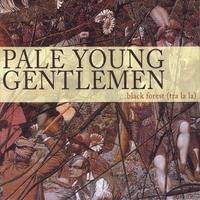Pale Young Gentlemen's self-titled debut was one of last year's best surprises. I described their debut as combining "an astute theatrical sound with jangly indie pop," and while that was true for that album, the growth displayed on Black Forest (Tra La La) shows a slightly different band. Where Pale Young Gentlemen had the fun-loving energy of a Saturday night spent with beers, dancing, and friends, Black Forest (Tra La La) is more akin to that wistful Sunday evening with a neat glass of scotch. Both have their qualities and a definite relation to the other, but are very different beasts.
You see, Pale Young Gentlemen felt like the debut it was. It was raw and energetic, but felt a little too spontaneous, a bit too much like a live performance thrown quickly onto tape. Black Forest (Tra La La) is a much more meticulously planned, fully-fleshed out album. It moves in a much slower manner, reflecting on the journey that has gotten the band to this point rather than the pure look forward that their debut was. This is found musically, but also lyrically: "I Wasn't Worried" moves at a steady, slow beat, while singer Michael Reisenauer notes, "with my bellows out and a comic grace / I rob the pockets of our good old days." The final track of the album, "She's All Mine, I Think," also depicts this newfound maturity, seeing the world with a more weathered eye, as Reisenauer remarks, "All my young ambitious plans are buried in these callused hands." The album still recalls the finer moments of Andrew Bird or the Decemberists, yet it does so without being derivative or sacrificing the band's originality.
The album adds a multitude of new musicians to the fold, including viola, violin, xylophone, French horn and harp, and has given the band more room to grow. There are moments on "Goldenface, Morninglight" that bring to mind the kind of classical arrangements that you would expect from a trip to the symphony, not a Wisconsin pop band. Rather than trying to overstimulate the listener by throwing all the instruments at once, the instruments are used only where their effect is greatest felt. And though there are moments that seem to drag on a little longer than they should, like the later choruses of "Marvelous Design," the band does a rather remarkable job of maintaining interest. "The Crook of My Good Arm" sounds downright devious during the verses, but brings lush imagery in its chorus as a stark contrast. It's followed with "Kettle Drum," a song that begins with effective minimalism through its sparse instrumentation, only to build to its subtle finale. "We Will Meet," one of the later tracks on the disc, is a marvelous track -- arguably the best the band has recorded. It starts out with an almost dreamlike beauty, rising and falling through the verses and choruses, only to break out with a much broader conclusion.
The strength of Black Forest (Tra La La) comes from the amount of effort placed in every minute of the disc. Rather than try to each steal the spotlight, each instrumentalist is patient and thoughtful, coming into sequence only when it suits the atmosphere invoked by each song. Though it travels a much slower and darker path than Pale Young Gentlemen, the album improves upon its predecessor in almost every respect. Black Forest (Tra La La) is an excellent and surprising followup to their first full-length, and one that should certainly be heard by a few more ears.
